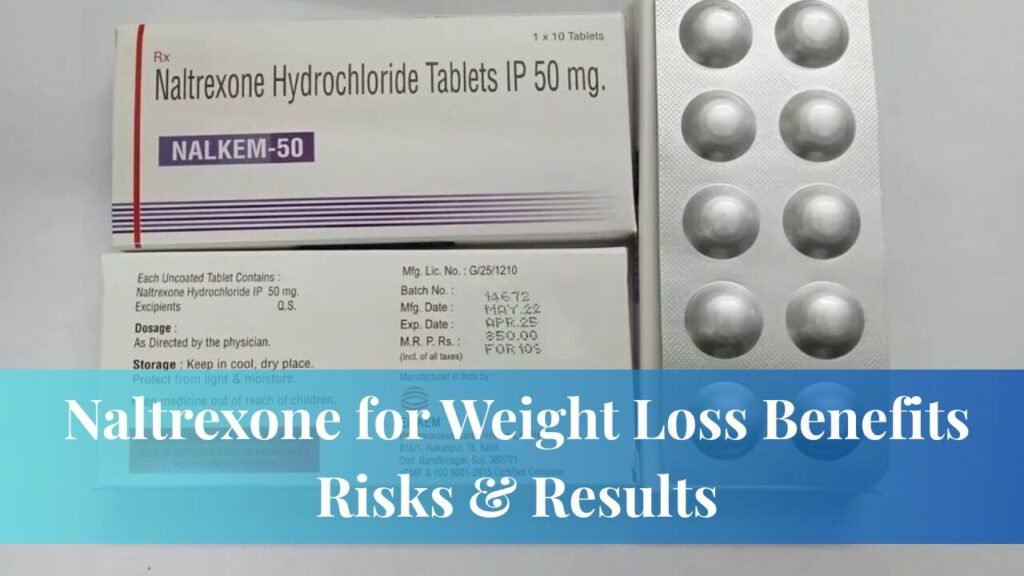Weight loss is a journey many embark on for improved health, self-esteem, and well-being. While diet and exercise remain cornerstones, medical interventions have grown in popularity. One such intervention is naltrexone for weight loss, a treatment initially designed for addiction management that has shown promise in helping individuals lose weight.
This comprehensive guide answers important questions about naltrexone’s effectiveness, risks, and whether it might be the right choice for you. Backed by science and current medical guidance, this resource provides a clear overview of its role in weight management.
What Is Naltrexone?
Naltrexone is a medication originally approved by the FDA to treat alcohol and opioid dependence. It works by blocking opioid receptors in the brain, reducing the euphoric effects of these substances. It is available under brand names such as Revia, Vivitrol, and Depade.
In recent years, it has gained recognition for its off-label use in weight loss, especially when taken in low doses or paired with other medications like bupropion. This new application has opened doors for patients struggling with both physical and emotional components of weight gain.
Low-Dose Naltrexone (LDN) for Weight Loss
Low-dose naltrexone, typically ranging from 0.5 to 4.5 mg per day, is thought to support the immune system and influence metabolic functions. Some preliminary studies and anecdotal reports suggest that LDN can reduce appetite, enhance insulin sensitivity, and promote fat metabolism.
Healthcare practitioners often prescribe LDN for individuals with thyroid issues, PCOS, or chronic inflammation all of which may contribute to weight gain. Its growing use in integrative medicine highlights its expanding role in weight management.
How Naltrexone Affects Weight
Naltrexone plays a significant role in appetite suppression by acting on the hypothalamus, which controls hunger and satiety. This can help users feel full more quickly and resist food cravings, supporting better eating habits and reducing overeating.
It may also enhance insulin sensitivity, allowing the body to regulate blood sugar more effectively and use fat for energy. Additionally, naltrexone’s influence on brain reward pathways can help decrease emotional and compulsive eating behaviors.
Enhanced Results with Bupropion
When combined with bupropion, as in the medication Contrave, naltrexone has a more potent effect on weight loss. Bupropion, an antidepressant, boosts dopamine and norepinephrine levels, improving mood and energy levels.
Together, these medications work on the central nervous system to suppress appetite and promote physical activity. This combination has been shown to support long-term weight loss and better adherence to lifestyle changes.
Clinical Studies and Evidence
Clinical trials have shown that the combination of naltrexone and bupropion leads to more significant weight loss compared to a placebo. One study published in The Lancet reported that participants lost an average of 5.4% of their starting body weight after 56 weeks.
Another study from the Journal of Clinical Psychiatry found that patients struggling with food cravings experienced fewer binge episodes and better control over portions when using the combination therapy. While more research is needed, current findings suggest it can be an effective part of a weight management strategy.
Benefits of Naltrexone for Weight Loss
Naltrexone may help reduce food cravings and emotional eating, supporting more consistent dietary habits. It can also improve metabolic health and may assist with long-term weight maintenance, especially in people who have struggled to keep weight off.
Unlike stimulant-based medications, naltrexone is non-habit forming. Some users also report improvements in mood, energy, sleep, and even chronic pain symptoms, particularly when the drug is used alongside bupropion.
Potential Side Effects and Risks
As with any medication, there are potential side effects. These may include nausea, headaches, dizziness, fatigue, and gastrointestinal discomfort. Some individuals may also experience anxiety, insomnia, or restlessness during treatment.
In rare cases, liver toxicity may occur, so it’s important to conduct liver function tests before starting. Naltrexone is not suitable for individuals with active liver disease, and stopping opioids abruptly before using it can trigger withdrawal symptoms.
Who Should Consider Naltrexone for Weight Loss?
Naltrexone may be appropriate for individuals with a BMI of 30 or higher, or those with a BMI of 27 or more who also have conditions like hypertension or type 2 diabetes. It is particularly beneficial for people dealing with food addiction or compulsive eating behaviors.
It can also be useful for those seeking a non-stimulant option, or individuals with depression or low energy when used in combination with bupropion. However, it is not recommended for pregnant or breastfeeding women, people with liver or kidney disease, or individuals using opioids or who have seizure disorders.
Real-World Insights and Testimonials
Beyond clinical studies, patient testimonials provide insight into real-world results. Many individuals report successful weight loss and better control over their eating habits after using low-dose naltrexone or Contrave.
Some people credit the medication with helping them finally manage cravings, lose significant weight, and maintain healthier lifestyles without feeling deprived or overly restricted. These stories continue to drive interest in the medication for those who have struggled with traditional weight loss methods.
Alternatives to Naltrexone for Weight Loss
Several alternatives to naltrexone exist for weight loss, including GLP-1 receptor agonists like Wegovy and Ozempic, which promote satiety. Medications like phentermine and semaglutide can also support weight loss by affecting appetite and metabolism.
In more severe cases, bariatric surgery may be considered, while non-pharmaceutical approaches like cognitive behavioral therapy, personalized nutrition programs, and intermittent fasting provide additional support. It’s important to discuss all options with a healthcare provider to choose what’s best for your goals.
Lifestyle Tips to Maximize Results with Naltrexone
To get the most out of naltrexone, it’s important to maintain a healthy lifestyle. Eating a balanced diet, staying hydrated, and exercising regularly can significantly improve outcomes. Strength training and cardio both contribute to long-term success.
Tracking meals, hunger cues, and sleep patterns can also be helpful. Managing stress through mindfulness or therapy may improve emotional well-being, which plays a role in maintaining healthy habits. Naltrexone is most effective when used as part of a comprehensive approach to wellness.
Conclusion
Naltrexone offers a promising option for individuals looking to lose weight, particularly when emotional or compulsive eating is a concern. Its effects on appetite, metabolism, and reward pathways can provide the push needed to break through weight loss plateaus.
Especially when used with bupropion or within a structured program, naltrexone can support lasting change. As always, consulting a licensed healthcare provider is the first step in determining if this medication aligns with your weight loss goals and overall health plan.
FAQs
How long does it take to see results with naltrexone?
Many users report noticeable appetite reduction within the first 1–2 weeks. Weight loss results typically follow within the first 4–6 weeks. Individual results may vary depending on diet, exercise, and underlying health conditions.
Is naltrexone safe for long-term use?
When monitored by a medical professional, naltrexone can be used safely for extended periods. Regular liver function tests and patient assessments are recommended to monitor any potential side effects.
Can naltrexone be used alone for weight loss?
It can be used alone, especially in low doses. However, results are typically enhanced when paired with bupropion or a structured weight loss program that includes nutrition and physical activity.
What’s the difference between Revia, Vivitrol, and Contrave?
Revia: Oral naltrexone used for daily dosing
Vivitrol: Injectable form, long-acting and administered monthly
Contrave: Oral combination of naltrexone and bupropion, FDA-approved for chronic weight management
Do I need a prescription for naltrexone?
Yes. Naltrexone is a prescription medication and should be obtained and used under medical supervision. Online telehealth platforms are now offering prescription consultations for weight management therapies.




